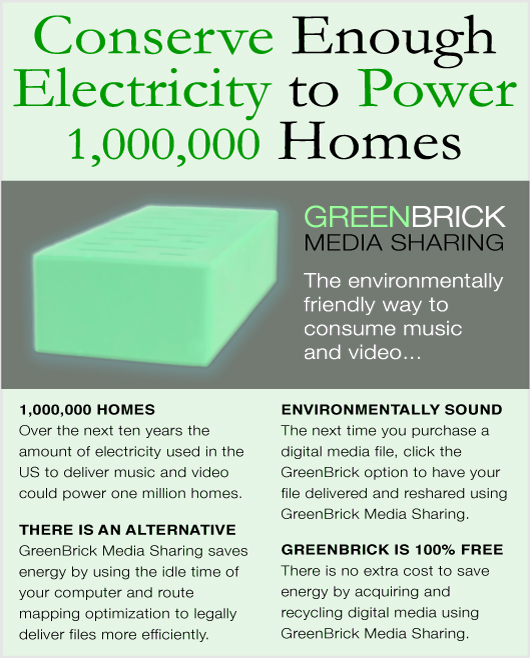A recent article in Harpers (via Nicholas Carr) describes a data center that Google is building that will use enough energy to power 82,000 homes a year. Information Week also reports that data centers worldwide will consume the combined output of fourteen nuclear or coal-fired power plants this year.
What if BitTorrent was repositioned as earth saving technology, and every time someone purchased a digital media file they had the opportunity to buy a locally “recycled” file instead of one that was sent from an energy intensive data center located 3,000 miles away? And, what if recycling everyone’s “spent” media files could save enough energy to power 1,000,000 homes a year?
In the scenario above, recycling is a codeword for file sharing. Language is powerful. Sharing is a negative word in the media industry, but recycling gives sharing an entirely new meaning. It would be hard to justify putting an end to file sharing - if sharing/recycling was found to be a highly efficient method for conserving a significant portion of the energy required to deliver digital media.
The consumption of digital media and cloud computing is exploding. You have to wonder if the far-flung, hub and spoke model that large data centers are founded upon is hugely inefficient compared to obtaining a song or a movie from your friends in the neighborhood? My guess and investors are betting that BitTorrent is more efficient.
BitTorrent may not be ideal for streaming; however if waiting ten minutes saves energy, the benefit should outweigh the inconvenience.
When companies, organizations and governments clamp down on file sharing, whose interests are being served? Are they protecting copyright holders, or are they protecting the billions of dollars that have been poured into the hub and spoke model for owning and delivering media files? It makes me wonder; there are legal and legitimate ways to use BitTorrent.
Think about this: BitTorrent is a disruptive technology; it enables just about anyone to be a media company without the burden of running a huge data center. The next time some entity clamps down on media sharing, politely remind them that they could be contributing to global warming☺
For the record, I am a rights holder. At this point, I believe file sharing will help the music industry more than it hurts. I also believe that every artist should be so lucky to have his or her music wildly shared around the globe. MP3 players are the new radio, BitTorrent is a broadcaster; if an artist is not on the “radio”, he or she will remain unknown.
What do you think? Conserve energy and get on the new “radio” - it all sounds like a win-win to me. (Note: The GreenBrick advertisement above is something I invented for this post.)